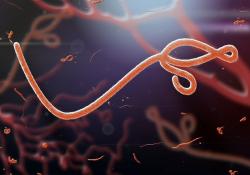Unfortunately, emerging disease outbreaks are nothing new. However, the current Ebola virus outbreak in Africa is showing us more than just the cracks in international public health response effectiveness. The unfolding situation is also showing how modern healthcare technology can help defeat the virus and how it could be applied to other emerging diseases.
Unfortunately, emerging disease outbreaks are nothing new. However, the current Ebola virus outbreak in Africa is showing us more than just the cracks in international public health response effectiveness. The unfolding situation is also showing how modern healthcare technology can help defeat the virus and how it could be applied to other emerging diseases.
 Since its first identified outbreak in Zaire in 1976, Ebola had been known for its deadliness (with mortality rates reaching 90 percent), as well as for its clearly identified transmittal. This year’s outbreak, while maintaining a very high death rate, was not as easily traced back to its original reservoir and is resisting efforts, for containment. So far, about 5,000 people in six countries have been infected, with no sign of letting up.
Since its first identified outbreak in Zaire in 1976, Ebola had been known for its deadliness (with mortality rates reaching 90 percent), as well as for its clearly identified transmittal. This year’s outbreak, while maintaining a very high death rate, was not as easily traced back to its original reservoir and is resisting efforts, for containment. So far, about 5,000 people in six countries have been infected, with no sign of letting up.
Public health agencies and medical researchers are responding to the latest outbreak with healthcare innovations unseen in previous infectious disease eradication efforts, such as:
- Rapid vaccine development thanks to recombinant and vector technology: Several genetically engineered vaccine candidates are being introduced to the field after minimal testing, with World Health Organization and other agency approval. This move reflects the severity of the outbreak, but also our capability to produce vaccines much faster using recombinant and vector technology.
- Collaborations around genetic sequencing and data sharing: The rapid collaboration of scientists, healthcare workers, volunteers and others from all over the world who came together to aid in the relief efforts, including the sequencing and sharing of data struck me as unprecedented. The collaborations led by Stephen Gire and Pardis Sabeti of Harvard and the Broad Institute along with many others have helped define the epidemic as well as how the virus spread and mutated.
- Immediate publishing of valuable sequencing results: The results from sequencing 99 Ebola isolates from 78 patients were published immediately, with no paywalls. The genetic changes detected should provide meaningful information to quickly develop better diagnostic tests, therapeutics and vaccines essential to help manage the current epidemic and future outbreaks.
- Online notification systems: In addition to the research on new tests, drugs, and vaccines, there are already a number of established online notification systems that provide up-to-date information on Ebola and other emerging or potential outbreaks. These systems include HealthMap, ProMED, and CDC Health Alert Network.
Despite the global efforts to understand and at the same time extinguish the Ebola virus epidemic there is still much work to be done. In addition, one look at existing online notification systems shows that many more outbreaks are happening globally, at the same time as Ebola in Africa. Hopefully many of the lessons learned will transfer to combatting other infectious diseases as they continue to emerge in all parts of the world. For example, could digital communication aid healthcare efforts in African clinics and hospitals, or could remote clinical trial models be applied to field introductions of still-experimental Ebola treatments?
ebola virus / shutterstock






